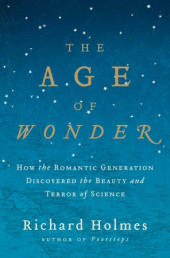E ach day leading up to the March 11 announcement of the 2009 NBCC award winners, Critical Mass highlights one of the thirty finalists. Today, NBCC board member Scott McLemee discusses NBCC nonfiction finalist Richard Holmes's The Age of Wonder: How the Romantic Generation Discovered the Beauty and Terror of Science (Pantheon)
ach day leading up to the March 11 announcement of the 2009 NBCC award winners, Critical Mass highlights one of the thirty finalists. Today, NBCC board member Scott McLemee discusses NBCC nonfiction finalist Richard Holmes's The Age of Wonder: How the Romantic Generation Discovered the Beauty and Terror of Science (Pantheon)
The great debate over “the Two Cultures” from fifty years ago was never resolved so much as argued to an exhausted standstill. At times the gap between the sciences and the humanities looks like an abyss. On the other hand, the number of novelists and philosophers grappling with neuroscience or artificial intelligence suggests there is still an Evel Knievel-like aspiration to get over it. Much of the appeal of Richard Holmes’s The Age of Wonder: How the Romantic Generation Discovered the Beauty and Terror of Science comes from its re-creation of a world in which the divide did not yet exist—in which imaginative writers were drawing their inspiration from the cutting edge of research and scientists themselves sometimes writing poetry and fiction.
The cliché, of course, is that the Romantics were in revolt against the cold, empty, dehumanized vision of the cosmos left in the wake of Newton’s mathematical physics and the disenchantments of the laboratory. The definitive statement of Romantic policy (on this account anyway) would come from Wordsworth, who was anti-science but pro-daffodil:
Sweet is the lore which Nature brings;
Our meddling intellect
Mis-shapes the beauteous forms of things:–
We murder to dissect.
But that is not even half of the story. Holmes plunges the reader into daily lives of the leading “natural philosophers” of the late eighteenth and early nineteenth centuries (the peculiar neologism “scientist” would not be coined until 1834) as they were radically challenging familiar notions of the size, shape, age, and structure of the universe. Science was not simply a way of understanding things that already existed; it was adding to the stock of available reality.
This was mind-expanding, but also mind-bending. Even the word “wonder” in Holmes’s title seems a bit understated in describing the intensity and the depth of the excitement involved. With his seemingly total recall of everything written by contemporary writers, artists, and journalists—as well as by the researchers themselves, both in their technical writings and in correspondence and notebooks—Holmes re-creates six decades of scientific and literary history in the form of a narrative that is never anything but perfectly absorbing.
The book’s style would once have been called “racy.” It moves with extraordinary speed, freedom, and casual grace across a wide range of topics and levels of detail; it shifts between sober scholarship and humorous observation with an ease that is occasionally astounding.
It is also racy in reminding us of a time when science was full of erotic implication. Holmes begins his story with the voyage to Tahiti, with Captain Cook, of the young Joseph Banks, whose observations of the island’s indigenous people left him completely unsuited for the normal hypocrisies of “civilized” life once he returned to England. Banks later became president of the Royal Society for Natural History, and he turns up repeatedly throughout later chapters—the figure tying the whole book together. But so, in its way, does the culture’s anxious sense that scientific exploration might challenge moral norms. The invention of the balloon in the 1780s provoked much blue humor about what couples did once free of the earth. Discovery of nitrous oxide inspired rumors about its libidinous effects.
And the account of Humphry Davy’s wildly successful lectures on chemistry in the early 1800s make him sound like a rock star. A cartoon of the day shows “a clutch of young women crowded into the left-hand balcony seats … gazing down attentively at Davy, while themselves being ogled by an ancient academic. This was the new science as sexual chemistry.”
Holmes was an NBCC awards finalist in 1999 for the second volume of his biography of Coleridge—and that procrastinating old polymath also turns up repeatedly in The Age of Wonder. He was fascinated by the new astronomy, participated in debates over vitalism, and scribbled in his notebook about the balloon as a metaphor for human aspiration. And, of course, Coleridge sampled some nitrous oxide along the way. Toward the end of his days, the sciences were growing more specialized and the Romantics much more anxious about the changes being wrought (with Mary Shelley’s Frankenstein as the extreme statement).
And so here we are. But Holmes takes us back to a different order of things, in a book that stands as a wonder-inspiring fusion of factual detail and imaginative power.
Click here to read an excerpt from The Age of Wonder.
Click here to see Richard Holmes discuss The Age of Wonder at the Bristol Festival of Ideas.


